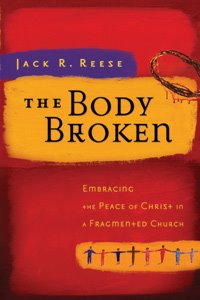
On the way home from our recent hunting trip in Childress, Dan, Todd and I stopped off at ACU and browsed through the bookstore, plunking down the plastic in favor of some books to stretch us and teach us.
One of the books I purchased was The Body Broken: Embracing the Peace of Christ in a Fragmented Church by Jack Reese, Dean of the Graduate School of Theology at ACU. Reese's thesis in the book is simple -- that Christians in the body of Christ should be able to have civil conversation with one another when differences arise.
Church history is littered with debris highlighting the inability of Christians to speak with each other. Reese is courageous, admitting he is personally willing to run the risk of being wrong but no longer willing to risk remaining silent in the midst of the fragmentation within the body of Christ (3). Far too often, the rancor and judgmentalism that has marked past history has brought bloodshed, but Reese finds many reasons for hope if the bloodshed is the blood of Jesus (33).
As Reese calls on Christians to act in accordance with the belief that unity must be prized, he does so with keen insight:
"This is a time to decide how we will act. For many of us, a great disconnect exists between what we believe and how we behave. This is true not only regarding personal morality but also, perhaps especially, our treatment of others. Some of us have assumed that the eternal ends we envision justify any means we employ, that we can speak unkindly about others if we think they are wrong, incompetent or dangerous. When we see other people as misguided or foolish, their conclusions erroneous, when we see them as too traditional or too liberal, as unthinking or indifferent or naive, we feel justified in disparaging them. We believe it is acceptable to talk about them to others, to dismiss them or demonize them, to write them up or put them down. We can caricature them as 'Pharisees' or 'change agents' without having to actually deal with them as people, as creatures made by God and precious in his sight. We can set them aside or write them off without any attempt at meaningful dialogue or engagement in prayer.
But how we act is an expression of what we believe, a direct manifestation of our values and commitments. Our behavior is a window into our soul. If you want to know what I think about Jesus, then look at how I treat others. If you want to know my theology, then consider first my conduct.
What gives me the greatest concern for the church in these decisive days is that the behavior of some Christians reflects nto the Christ of the Gospels but a vindictive and judgmental Jesus or a cynical and flippant Jesus. This is not what these individuals want or teach, of course, but their conduct reveals their theology, exposing a view of Jesus that is, at the same time, impotent and dangerous. Whatever one's positions may be regarding any of the issues that trouble our churches, such attitudes, reflecting both ends of the spectrum, are quenching the Spirit. The behaviors they spawn make the unity of Christ's church impossible. Moreoever, these behaviors are driving our children away (40-41)."